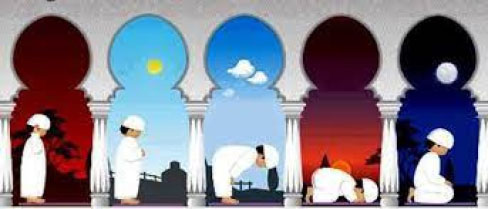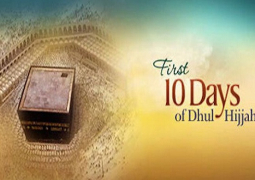
The number of prayers prescribed by Allah is five. Ibn Mahyraiz narrated that al-Makhdaji, from the tribe of Kananah, heard Abu Muhammad--a man in ash-Shams--saying, “The witr prayer is obligatory.” He said he went to ‘Ubadah ibn as-Samit and informed him of this. ‘Ubadah corrected him, saying, “Abu Muhammad is mistaken. I heard the Messenger of Allah, upon whom be peace, say ‘Allah has laid five prayers upon His slaves. Whoever fulfills them and does not miss any of them will have a pact with Allah that He will let him enter Paradise. Whoever does not come with them will have no pact with
Allah. If He wishes, He may punish him, and if He wishes, He may forgive him.” (Related by Ahmad, Abu Dawud, an-Nasa’i and Ibn Majah.) In one version it states, “Or one who comes with a deficiency in them or who degrades their duties.” Talhah ibn ‘Ubaidullah narrated that a Bedouin with unkempt hair came to the Messenger of Allah, upon whom be peace, and said, “O Messenger of Allah, inform me of what Allah has made obligatory on me as regards praying.” He said, “Five prayers, unless you do others voluntarily.” He asked the Prophet to inform him about fasting, and he said, “The fast of Ramadan, unless you do others voluntarily.” Then he asked him about charity...and the Messenger of Allah informed him of the Islamic legislations. The Bedouin then said, “By the One who has honored you, I shall not voluntarily add anything to it, nor shall I be deficient in what Allah has ordered me to do.” The Messenger of Allah, upon whom be peace, then said, “He will enter Paradise if he is truthful (to what he said).” (Related by al-Bukhari and Muslim.)
The Times of the Prayers
Each prayer has its own particular time at which it must be performed. Says Allah, “Prayer at fixed hours has been enjoined upon the believers” (an-Nisa’ 103).
The Qur’an itself points to these different times
Allah says, “Pray at the two ends of the day and in some watches of the night. Lo! Good deeds annul evil deeds. This is a reminder for the mindful” (Hud 114). Surah al-Isra’ states, “Establish prayer at the setting of the sun until the dark of the night, and (the recital) of the Qur’an at dawn. Lo! The recital of the Qur’an at dawn is ever witnessed” (al-Isra’ 78), and “Celebrate the praises of your Lord before the rising of the sun and before its setting. Glorify Him some hours of the night and at the two ends of the day, that you may find acceptance” (Taha 130). This verse specifically refers to the dawn prayer and the afternoon prayer, as it is recorded in the two Sahihs. Jarir ibn ‘Abdullah al-Bajali reported, We were sitting with the Messenger of Allah and we looked at the moon on a clear night. The Prophet said, ‘You will see your Lord as you see this moon, and you will not be harmed by seeing Him. So, if you can, do not let yourselves be overpowered in the case of prayer before the rising of the sun and its setting,’ and he recited the above verse.”
Those are the times of the prayers that the Qur’an mentions. From the sunnah, we have the following:
‘Abdullah ibn ‘Amr reported that the Messenger of Allah, upon whom be peace, said, “The time of the noon prayer is when the sun passes the meridian and a man’s shadow is the same length as his height. It lasts until the time of the afternoon prayer. The time of the afternoon prayer is until the yellowing of the sun (during its setting). The time of the evening prayer is as long as twilight. The time of the night prayer is to the middle of a night of medium duration. And the time of the morning prayer is from the appearance of the dawn until the time of sunrise. When the sun rises, abstain from praying, as it rises between the horns of Satan.” (Related by Muslim.)
Jarir ibn ‘Abdullah narrated that the angel Gabriel came to the Messenger of Allah and said to him, “Stand and pray,” and they prayed the noon prayer when the sun had passed its meridian. He then came to him for the afternoon prayer and said, “Stand and pray,” and they prayed the afternoon prayer while the length of a shadow of something was similar to the length of the object. Then he came a t sunset and said, “Stand and pray,” and they prayed the sunset prayer when the sun had just disappeared. Then he came at night and said, “Stand and pray,” and they prayed the night prayer when the twilight had disappeared. He came again when dawn broke (and they prayed the morning prayer). Then Gabriel came on the next day at noon and said (to the Messenger of Allah), “Stand and pray,” and they prayed the noon prayer when the length of the shadow of something was close to the length of the object. Then he came for the afternoon prayer and said, “Stand and pray,” and they prayed when the shadow of something was twice as long as the length of the object. Then he came at the same time (as the previous day) for the sunset prayer, without any change. Then he came for the night prayer after half of the night had passed (“or,” he said, “one-third of the night”). Then he came when the sky was very yellow and said, “Stand and pray,” and they prayed the morning prayer. Then Gabriel said, “Between these times are the times for the prayers.”
As to the authenticity of the report, it is recorded by Ahmad, an-Nasa’i and at-Tirmizhi. Al-Bukhari observes, “It is the most authentic report concerning the prayer times.”
The Time for the Noon Prayer (Zhuhr)
The previous two hadith make it clear that the noon prayer begins when the sun passes its meridian and it continues until an object’s shadow is approximately the same length as the object itself. If it is extremely hot, it is preferred to delay the noon prayer until it is cooler. This is done in order to retain the humility and awe of the prayer. If this is not the case, it should be prayed early in its time. This opinion is based on the following hadith: Reported Anas, “If it was extremely cold, the Prophet, upon whom be peace, would pray early. If it was extremely hot, he would wait for it to cool down.” (Related by al-Bukhari.) Abu Zharr relates, “We were with the Prophet, upon whom be peace, on a journey. When the caller to prayer wanted to give the azhan, the Prophet said ‘Let it cool down.’ This happened two or three times, until we saw the shadows of the hills. Then the Prophet said, ‘The extreme heat is from the fragrance of Hell. If the heat becomes extreme, delay the prayer until it becomes cool.” (Related by al-Bukhari and Muslim.) However, this delay does have a limit. According to Ibn Hajr’s Fath al-Bari, “The scholars differ over how long one may wait to let the temperature cool. Some say, ‘Until the shadow of an object becomes an arm’s length,’ or ‘Until the shadow becomes one-fourth of one’s height.’ Others say one-third or one-half, and so on. Its ruling is according to its basic principle, and it changes with different circumstances, provided that the prayer is not delayed until the end of its time.”
TO BE CONTINUED
Read Other Articles In Muslims Hands
PRAYERS: Their Significance, Supererogatory Prayers
Sep 9, 2022, 2:04 PM
Sickness: Treatment by a non-Muslim Physician
Jun 12, 2020, 3:08 PM


